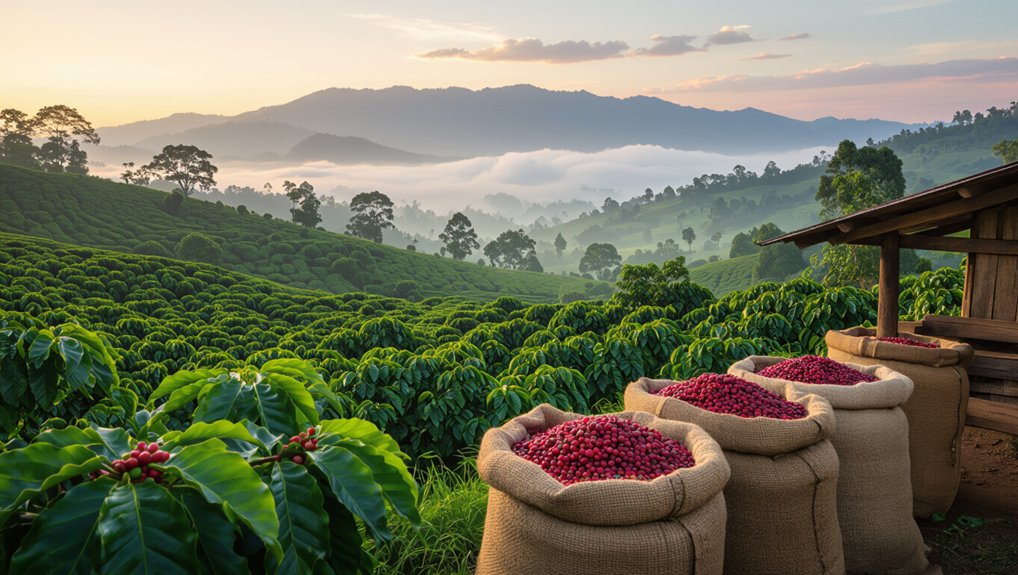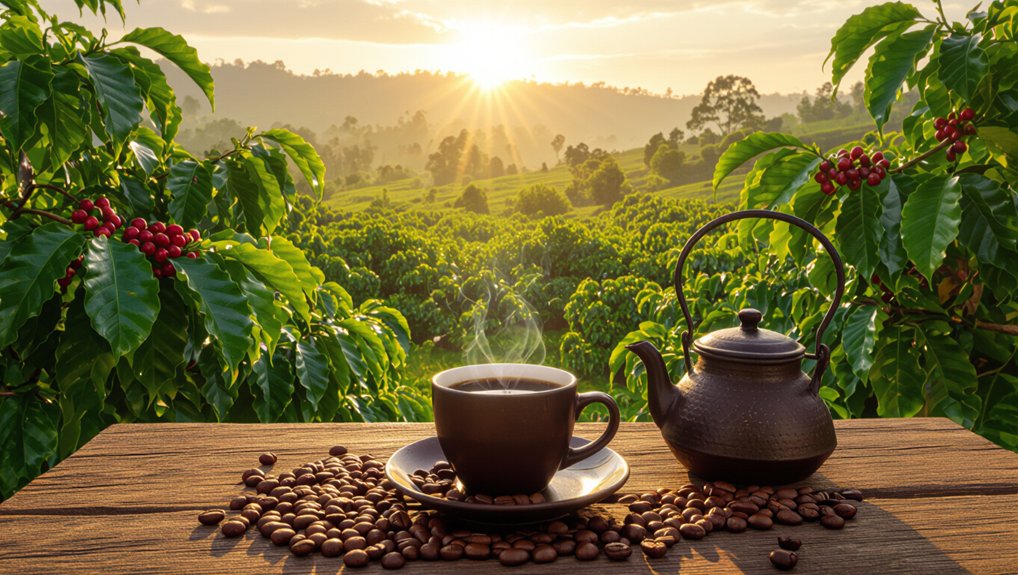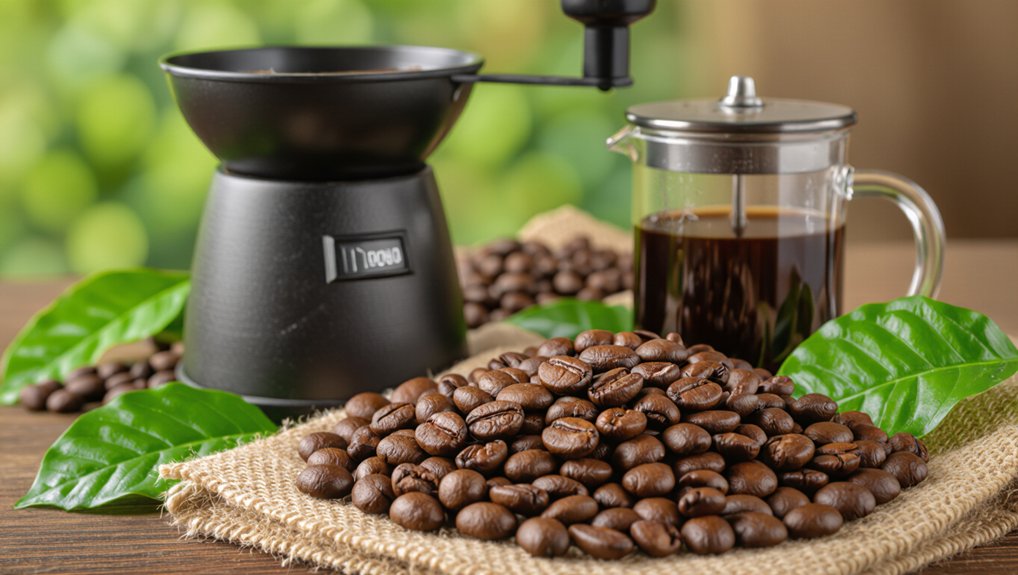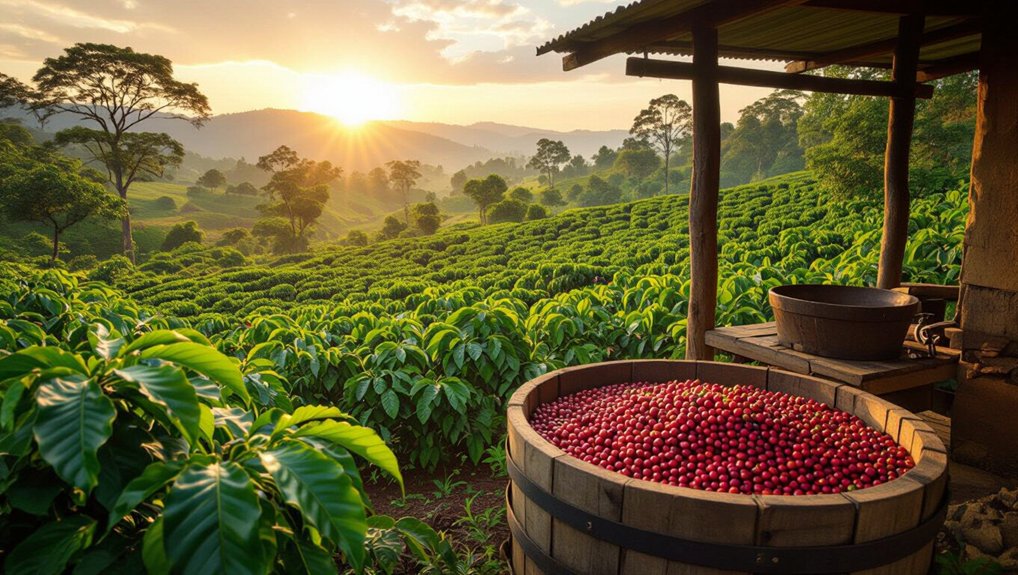Ever wondered why Uganda’s coffee remains one of East Africa’s best-kept secrets? Despite being Africa’s second-largest coffee producer, Ugandan beans rarely get the recognition they deserve in specialty coffee circles. Many coffee enthusiasts overlook this origin entirely, missing out on distinctive flavors that rival more famous African coffees.
Uganda’s coffee story spans volcanic mountain slopes, generations of family farming, and unique processing methods that create surprisingly complex flavor profiles. From the robust Robusta beans that thrive in lower altitudes to the delicate Arabica varieties grown on Mount Elgon’s misty peaks, this origin offers something for every coffee lover.
This guide will explore Uganda’s coffee heritage, decode its distinctive flavor characteristics, and provide practical brewing advice to help you unlock the full potential of these remarkable beans. Whether you’re a curious beginner or experienced home roaster, you’ll discover why Ugandan coffee deserves a place in your regular rotation.
History of Coffee Production in Uganda

Although coffee has deep roots in Uganda’s agricultural landscape, its journey from a local crop to a global commodity is a fascinating tale of resilience and adaptation. Native Robusta coffee thrived in Uganda for centuries before Arabica’s introduction in the 20th century.
Ugandan farmers traditionally focused on coffee production, developing unique washing and processing techniques that highlight their coffee’s distinctive flavor profiles. The 1992 sector liberation transformed Uganda’s coffee farming practices, allowing farmers to prioritize quality over quantity.
Today, Uganda stands as the eighth-largest global coffee producer, with its coffee representing a rich agricultural heritage.
Coffee Varieties and Growing Regions

Ever wondered what makes Ugandan coffee so special? Let me take you on a journey through its diverse coffee varieties and growing regions.
- Arabica coffee thrives in the volcanic soils of Mount Elgon
- Robusta dominates Central Uganda’s landscape
- Washing processing enhances Arabica’s clean, bright flavor
- Elevations between 1,300-2,300 meters create complex taste profiles
- Specialty Ugandan coffees offer citrusy and wine-like notes
From the eastern mountains to western highlands, Ugandan coffees showcase incredible diversity.
Each region’s unique terroir brings distinctive characteristics—whether it’s the fruity notes of Mount Elgon Arabica or the bold, resilient Robusta grown in central regions, you’ll discover a world of flavor in every sip.
Processing Methods and Flavor Profiles

When you dive into Uganda’s coffee processing methods, you’ll discover a world of flavor craftsmanship that transforms humble coffee cherries into liquid gold.
Washed processing in regions like Mount Elgon and the Bugisu region creates Ugandan Arabica with clean, fruity flavors and winey acidity. Natural processed coffees from the Rwenzori Mountains offer a bold, dark berry jam experience.
These processing methods dramatically influence flavor profiles, with washed coffees delivering satiny bodies and delicate red berry notes, while natural coffees provide rich, intense tastes that coffee lovers crave.
Sustainability and Farming Practices

From the precise art of processing coffee cherries, Uganda’s coffee story extends far beyond flavor—it’s a narrative of environmental stewardship and farmer empowerment.
Sustainability isn’t just a buzzword here; it’s a way of life for Ugandan farmers committed to preserving their land and improving coffee quality.
- Organic farming techniques protect soil health
- Wet mills enhance processing efficiency
- Bonus programs incentivize crop quality improvements
- Collaboration with experts drives continuous innovation
- Environmental stewardship is central to coffee production
These practices ensure that every cup tells a story of responsible farming, proving that great coffee can be both delicious and sustainable.
Brewing Techniques for Ugandan Coffee

Because each Ugandan coffee bean carries a unique flavor profile, mastering the right brewing technique can transform your morning cup from ordinary to extraordinary.
For washed Arabica, I recommend a pour-over method with a 1:15 coffee-to-water ratio, brewing at 195-205°F.
Robusta? Grab your French press and use a coarser grind to capture its bold, jammy flavors. Steep for about 4 minutes, keeping water temperature consistent.
Whether you’re working with natural or washed processed beans, pay attention to grind size and brewing time—they’ll dramatically influence your Ugandan coffee’s final taste.
Experiment and enjoy!
Tasting and Experiencing Ugandan Coffee

After perfecting your brewing technique, you’re ready to unlock the sensory adventure of Ugandan coffee. This region’s unique growing conditions create extraordinary flavor profiles that’ll tantalize your taste buds.
- Discover the winey acidity of Bugisu coffee
- Experience sweet chocolate undertones
- Savor citrusy notes from high-elevation Arabica
- Compare washed and natural processed varieties
- Explore delicate red berry hints
Uganda coffee offers a remarkable journey through its Arabica growing landscapes.
You’ll find washed coffees presenting a satiny body with stone fruit elegance, while natural processed beans deliver dark berry jam flavors.
Each sip reveals the complex character of this extraordinary coffee origin.
Frequently Asked Questions
How Does Uganda’s Coffee Compare to Other African Coffee-Producing Countries?
I find Uganda’s coffee unique, with its bright acidity and complex flavor profile standing out among African producers. While Kenya and Ethiopia are more renowned, Uganda’s beans offer a distinctive, high-quality alternative in the specialty coffee market.
Can Tourists Visit Ugandan Coffee Farms and Participate in Harvesting?
Yes, I’ve toured coffee farms in Uganda and can confirm you’ll find amazing opportunities to harvest coffee cherries, learn about processing, and engage directly with local farmers during harvest seasons, typically from October to February.
What Certifications Do Ugandan Coffee Farms Typically Hold?
I’ve found that Ugandan coffee farms often hold Fairtrade, Organic, and Rainforest Alliance certifications. These validate their sustainable practices, fair worker treatment, and environmental stewardship, which are crucial for maintaining international coffee market credibility and consumer trust.
Are There Unique Coffee Traditions or Ceremonies in Ugandan Culture?
I’ve discovered that while Uganda doesn’t have elaborate coffee ceremonies like Ethiopia, local communities often share coffee during social gatherings, treating it as a communal experience that symbolizes hospitality and connection among friends and family.
How Has Climate Change Impacted Coffee Production in Uganda?
Climate change has devastated our coffee farms. Rising temperatures and unpredictable rainfall are shrinking viable growing regions, threatening farmers’ livelihoods. I’ve seen firsthand how these shifts are reducing crop yields and forcing many to reconsider their agricultural strategies.
In Conclusion
Uganda’s coffee journey is more than just a beverage—it’s a passionate story of tradition and taste. If you’re looking to explore incredible coffee, Ugandan beans offer an unparalleled experience. From the volcanic soils of Mount Elgon to your morning brew, these coffees represent a rich cultural heritage. Whether you prefer washed Arabica or robust Robusta, you’ll discover unique flavors that connect you directly to the heart of East African coffee culture.








Leave a Reply
You must be logged in to post a comment.